How Generative AI will Transform Health Care and Finance
Columbia Engineering, Business, and Medical schools convened panels of leading experts to explore the future of this transformative technology.
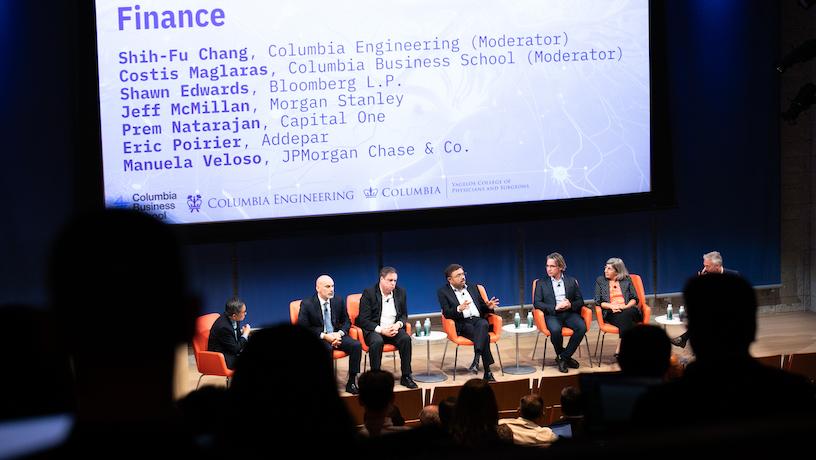
Leaders in finance discuss the impact of AI on the industry. Photo: David Dini
Leaders in business and research convened at The Forum at Columbia University on Nov. 2, 2023, to discuss the opportunities that rapid advancements in generative AI present for health care and finance. The event was organized by Columbia Engineering in collaboration with Columbia Business School and Columbia’s Vagelos College of Physicians and Surgeons.
In opening remarks, Shih-Fu Chang, dean of Columbia Engineering and Morris A. and Alma Schapiro Professor, said this timely event — held just before the one-year anniversary of ChatGPT’s public release — draws on Columbia's central location in New York City and on the unique combined expertise across the engineering, business, and medical schools.
“We know AI is the talk of every dinner, every conversation inside and outside the university and in industry,” Chang said. Over the last several months, the university has hosted discussions on AI in fields ranging from education to finance to art. Chang said the schools chose to focus on health care and finance for three reasons.
“First, they represent the most active industries in New York City. Second, we have a lot of alumni leaders who are leading innovative businesses in these areas. Third, they represent a wonderful set of opportunities for collaboration across schools at Columbia.”
The event, broken into two moderated panel discussions, garnered lively engagement with audience members.
Letting doctors be doctors
While generative AI will likely impact nearly every segment of the health care industry, many of the most pressing use cases the panelists discussed have to do with electronic medical records. Today, clinicians spend an enormous amount of time writing notes, wading through records, and trying to make sense of dozens or hundreds of pages of information that might – or might not — be relevant to clinical decision making.
David K. Vawrey, chief data and informatics officer at Giesinger, a not-for-profit integrated health system in Pennsylvania, pointed to ambient documentation as an important AI-powered tool his organization is using to improve the patient experience and increase physician productivity and satisfaction.
“Our goal with ambient documentation is to reduce the amount of unproductive time the clinician has to spend in the computer system,” said Vawrey, who also teaches clinical biomedical informatics at Columbia.
For David C. Rhew, the chief medical officer at Microsoft, AI tools are poised to help address current and future shortages in the clinician workforce by alleviating all kinds of rote and repeatable work.
“We think of AI as just helping to remove the administrative load, but it's doing much more than that. It's helping clinicians who are currently underwater be able to float and stay on top of their work,” he said.
Finding a place in the clinical workflow
All of the panelists made the point that AI tools aren’t solutions in and of themselves, but will augment human decision making and must — at least initially — fit into existing workflows. Moderator Noémie Elhadad, department chair and associate professor of biomedical informatics at Vagelos College of Physicians and Surgeons, noted that it is unclear how to evaluate generative AI tools in clinical workflows.
“If we want to deploy a clinical decision support system, it needs to be accurate and useful. Otherwise, it's not worth it,” she said. “But with an AI tool that generates clinical documentation, for instance, assessing the accuracy and utility of a clinical note is a complex task in itself. At the same time, colleagues remind me that residents who write clinical documentation sometimes make mistakes too, and it's okay because we know they’re residents and we take that into account.”
Erich S. Huang, head of clinical informatics at Verily, Alphabet’s life science research organization, pointed to the clinician’s user experience as a vital part of evaluating these technologies. “Regardless of how accurate the diagnosis is, there’s a behavioral science aspect we have to consider,” he said.
Huang gave the example of an algorithm for determining patient risk of pressure ulcers that was deployed at a hospital where he worked. The algorithm assessed risk using its own metric that was completely different from the standard scale taught in nursing school.
“There was a rebellion from the nursing staff in response to this algorithm because of how much extra work it gave them without any perceived benefit,” he said.
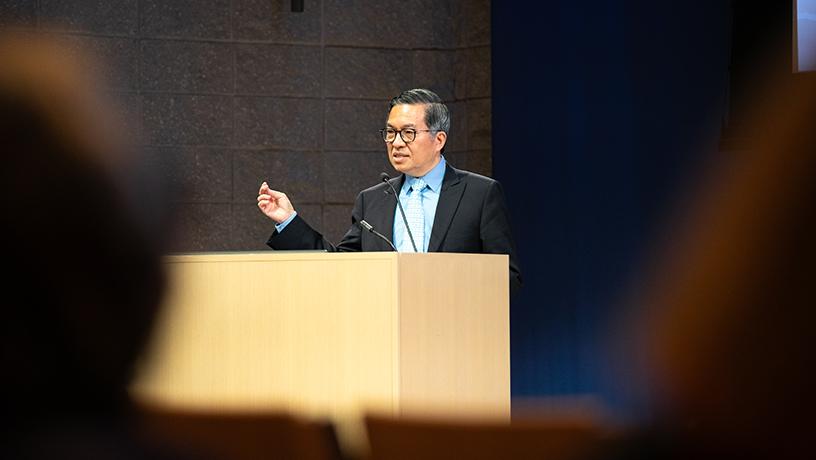
Dean Shih-Fu Chang welcomes attendees. Credit: David Dini
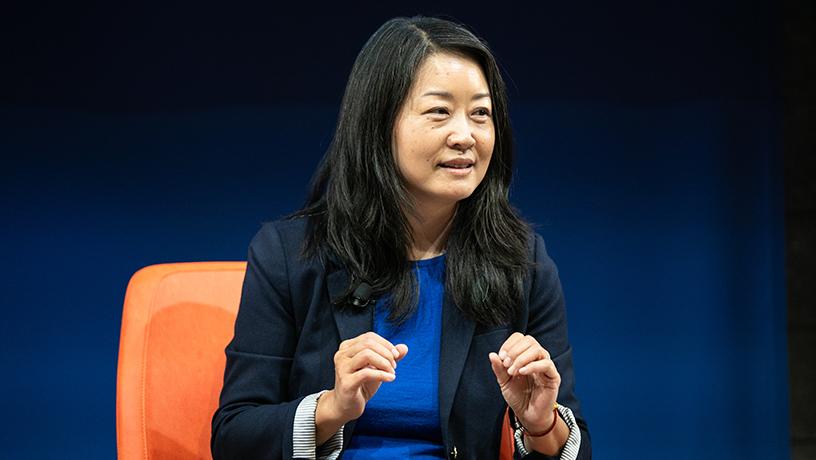
Panelist Xiaoying Wu, Vice President of Data Science & Health for J&J Pharmceuticals R&D. Credit: David Dini
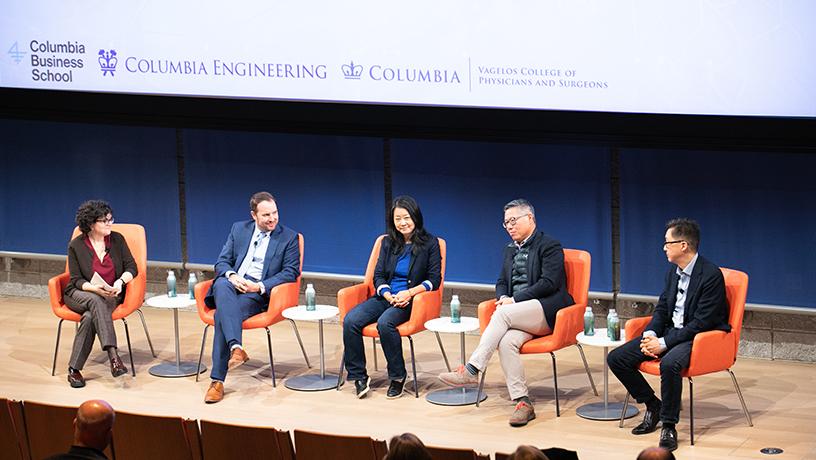
The panel on generative AI and healthcare. Credit: David Dini
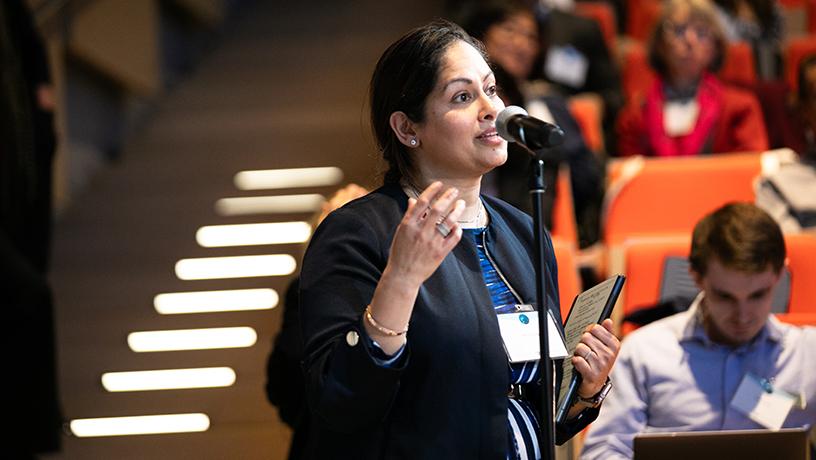
An engaged member of the audience. Credit: David Dini
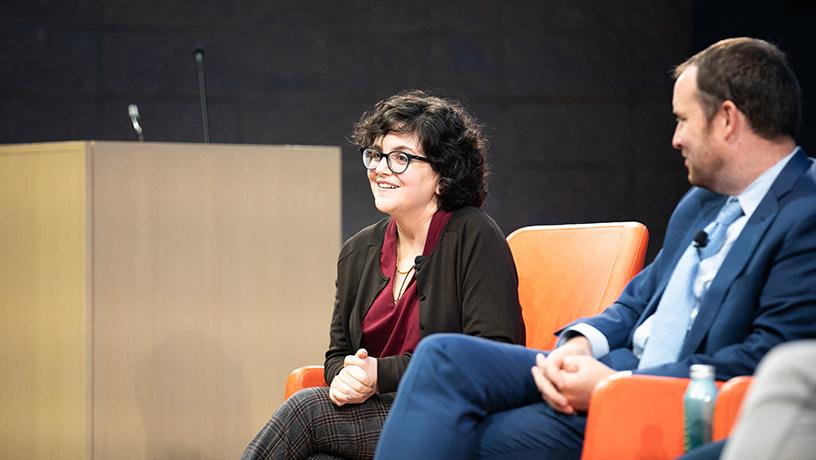
Moderator Noemie Elhadad, department chair and associate professor of biomedical informatics at Vagelos College of Physicians and Surgeons, responds to a question from the audience. Credit: David Dini
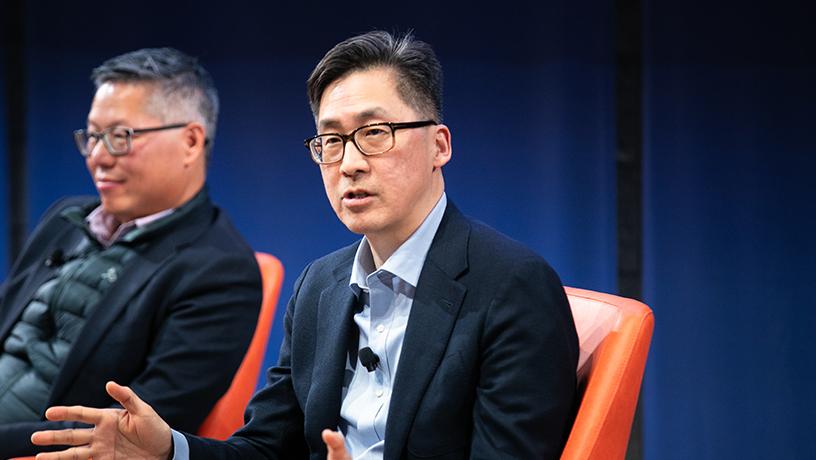
David C. Rhew, chief medical officer at Microsoft, makes a point. Credit: David Dini
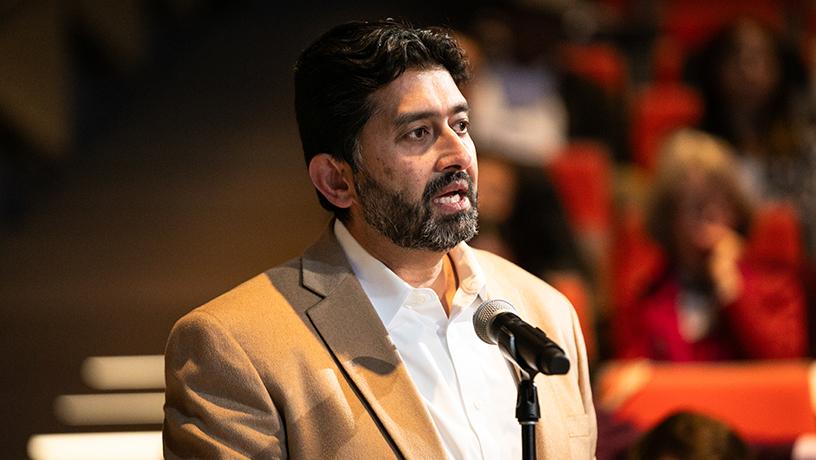
An engaged member of the audience. Credit: David Dini
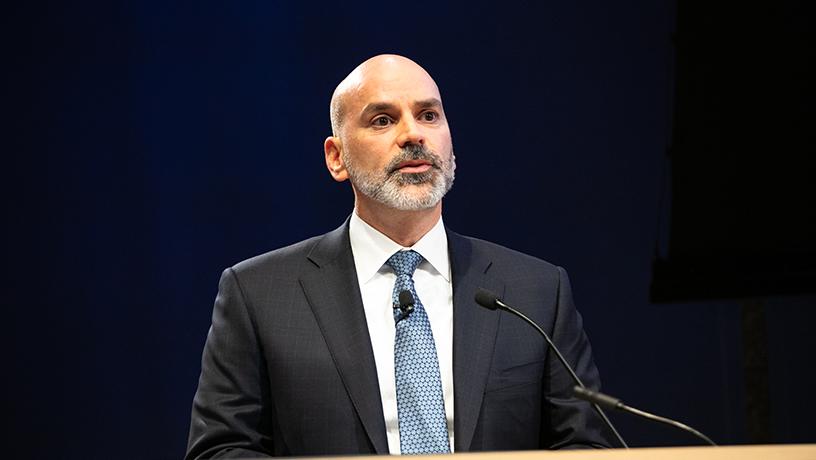
Shawn Edwards (SEAS BS’90, MS’95), chief technology officer at Bloomberg, emphasized that AI tools aren’t new to the financial sector. Credit: David Dini
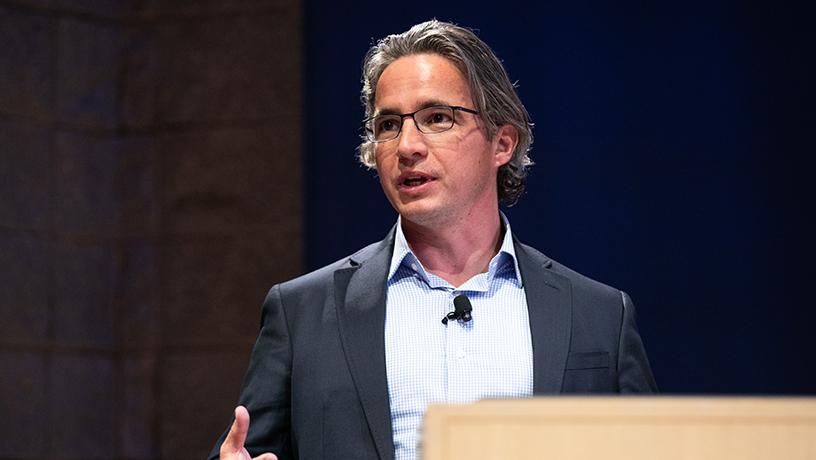
Eric Poirier (SEAS BS’04) is chief executive at fintech startup Addepar. Credit: David Dini
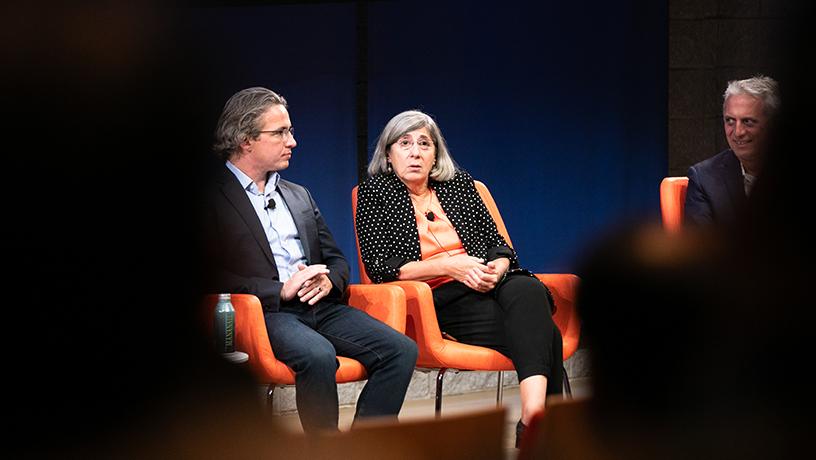
Manuela Veloso, head of J.P. Morgan Chase AI Research and Herbert A. Simon University Professor Emerita in the School of Computer Science at Carnegie Mellon University. Credit: David Dini
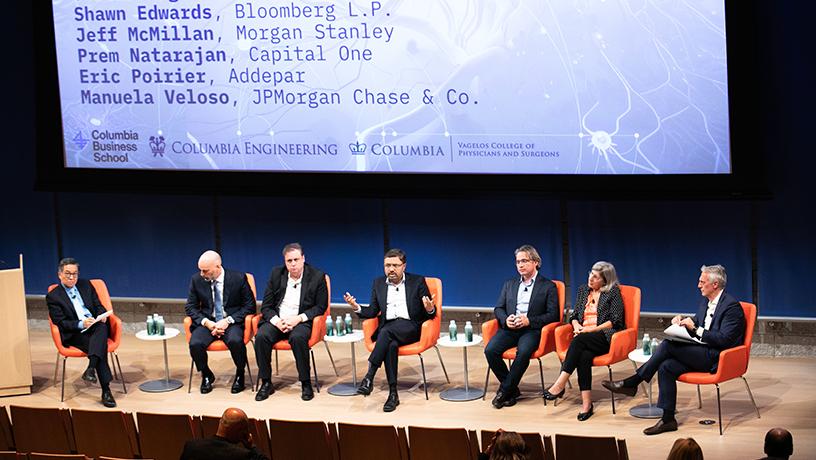
The panel on generative AI and finance. Credit: David Dini
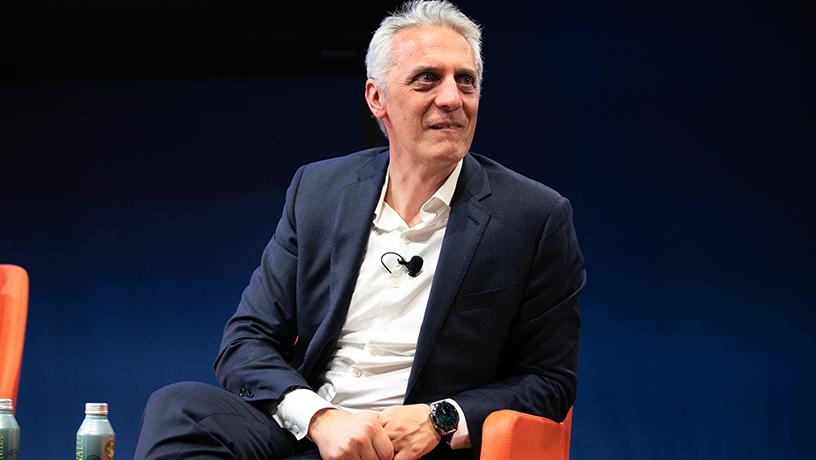
Columbia Business School Dean Costis Maglaras. Credit: David Dini
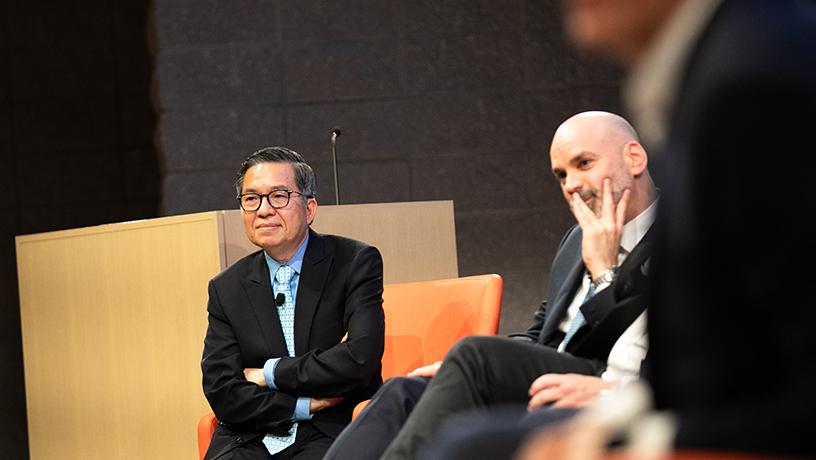
Columbia Engineering School Dean Shih-Fu Chang. Credit: David Dini
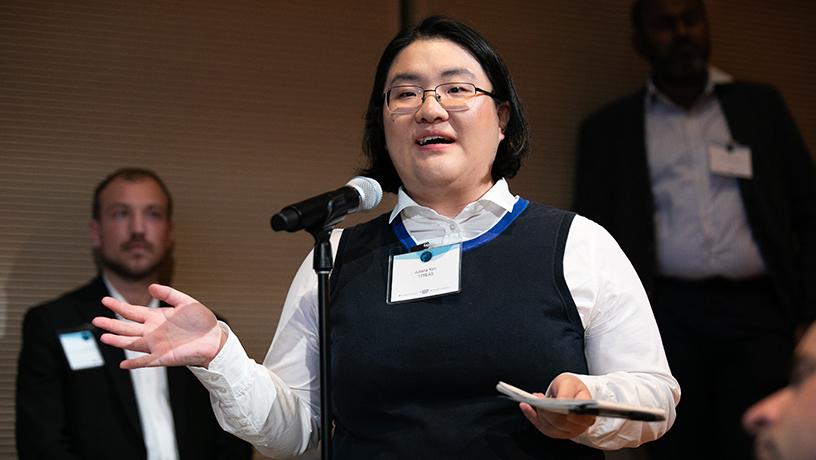
An engaged member of the audience. Credit: David Dini
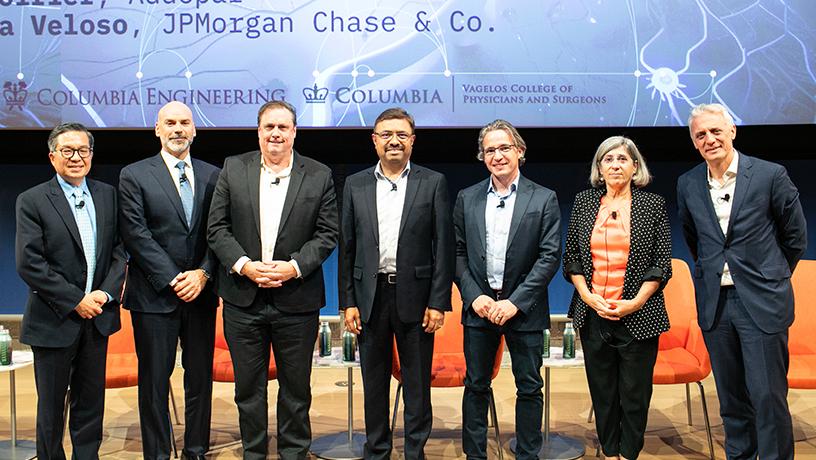
The members of the generative AI and finance panel. Credit: David Dini
Extracting value from reams of information and future outlook
The panel on AI and finance, moderated by Dean Chang and Columbia Business School Dean Costis Maglaras, centered on finding value in the enormous amount of information that’s available to financial institutions and investors. Understanding that progress is happening so fast, the panelists also discussed the future impact of generative AI in business.
Shawn Edwards (SEAS BS’90, MS’95), chief technology officer at Bloomberg, emphasized that AI tools aren’t new to the financial sector. His company has been using AI tools for 15 years and currently uses hundreds of algorithms to process more than two million documents per day.
“Almost every single one of those documents is analyzed by multiple machine learning models, doing tasks such as topic classification, information extraction, and sentiment analysis. That’s our bread and butter,” Edwards said.
The firm published a research paper in March 2023 about BloombergGPT, the first domain-specific LLM to integrate general knowledge and financial data, such as
financial news, corporate filings, and earnings transcripts. Edwards cautions that LLMs are not a replacement for human expertise or other tools.
“We think of it as an ingredient that can mix with our trusted data sources, analytics, and workflows for specific use cases,” he said.
Jeff McMillan, managing director, chief analytics, data and innovation officer at Morgan Stanley Wealth Management, shared how generative AI is helping financial advisors work smarter, better, and faster. The wealth management firm inked an innovation partnership with OpenAI to pair the power of OpenAI’s generative AI technology with Morgan Stanley’s vast knowledge base—every research report, every policy, every procedure—enabling its employees to have instant access, he says, “to the most knowledgeable person at the firm, instantaneously.”
In the future, generative AI is going to function in a way where the AI is just one layer in multi-layers of data. “There is a layer of artificial intelligence, and there’s every single piece of technology, content, friend, relationship that sits underneath that,” says McMillan. “And what we’re going to do is we’re going to interact with the AI and then the AI is going to interact with all of this technology … I’ve never been more excited about where this is all headed.”
Prem Natarajan, chief scientist and head of AI at Capital One, said that the current state of generative AI already provides a strong foundation for transformative outcomes across a broad set of use cases in finance. On the future outlook of AI, Natarajan said the next frontier for AI, generative or otherwise, is to develop the capacity of reasoning, including the reasoning behind predictions and business decision making. For example, can AI accurately assess a complex problem such as a company’s supply chain weaknesses?
In the tech world, science is good at hacking away at the gaps between what we want and what exists. And one of those big gaps is reasoning. "I think in 10 years, people are going to start hacking away at that,” said Natarajan.
Panelist Eric Poirier (SEAS BS’04), chief executive at fintech startup Addepar, raised the point that generative AI is really helping professionals break down silos. “Teams are already solving problems in a multidisciplinary way using generative AI–it’s no longer siloed workstreams,” he said. “Cross-functional departments are able to engage with this powerful new domain, new way of thinking, and new way of working.”
Manuela Veloso, head of J.P. Morgan Chase AI Research and Herbert A. Simon University Professor Emerita in the School of Computer Science at Carnegie Mellon University, emphasized that AI systems are designed to augment — not replace — human intelligence and decision making.
“It is never just going to be AI,” she said. “The challenge in the financial world in particular is to think about this integration: the data and the human very deep knowledge of the business.”
